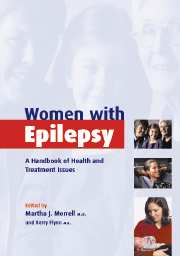Book contents
- Frontmatter
- Contents
- List of contributors
- Part I The woman with epilepsy
- Part II Epilepsy diagnosis and treatment
- Part III Hormones and the brain
- 10 Brain differences
- 11 Sex hormones and how they act in the brain: a primer on the molecular mechanisms of action of sex steroid hormones
- 12 Epilepsy and the menstrual cycle
- 13 Menopause and epilepsy
- Part IV Health challenges for women with epilepsy
- Part V Family planning, pregnancy, and parenting
- Part VI Living well with epilepsy
- Appendix: The Epilepsy Foundation's Campaign for Women's Health: bringing help and hope to women with epilepsy
- Index
- References
11 - Sex hormones and how they act in the brain: a primer on the molecular mechanisms of action of sex steroid hormones
from Part III - Hormones and the brain
Published online by Cambridge University Press: 02 November 2009
- Frontmatter
- Contents
- List of contributors
- Part I The woman with epilepsy
- Part II Epilepsy diagnosis and treatment
- Part III Hormones and the brain
- 10 Brain differences
- 11 Sex hormones and how they act in the brain: a primer on the molecular mechanisms of action of sex steroid hormones
- 12 Epilepsy and the menstrual cycle
- 13 Menopause and epilepsy
- Part IV Health challenges for women with epilepsy
- Part V Family planning, pregnancy, and parenting
- Part VI Living well with epilepsy
- Appendix: The Epilepsy Foundation's Campaign for Women's Health: bringing help and hope to women with epilepsy
- Index
- References
Summary
Women with epilepsy have known for some time that female hormones affect seizures. Scientists have only recently begun to understand why this is so. Hormones impact brain function in many ways. Female sex hormones change the excitability of brain neurons by increasing excitation or inhibition. These hormones act on the cell membrane, changing the threshold for firing, change the rate at which neurons manufacture excitatory and inhibitory brain chemicals, and even change the shape of neurons, altering the way brain cells connect to one another.
Dr Philip Schwartzkroin addresses this fascinating and complex topic. Dr Schwartzkroin is a PhD in Neuroscience and is a Professor of Neuroscience at the University of California Davis, where he heads a laboratory that studies how epilepsy develops in the brain. Further research into the science of hormone effects on brain neurons will lead to better understanding of epilepsy and, most certainly, to new treatments.
MJMScientists have long known that steroid sex hormones – those hormones that are made in the ovaries in women and in the testes in men – are critical elements in reproductive and other sexual behaviors. We are only beginning to understand, however, that these same hormones can exert influences on regions of the brain that have little to do – at least directly – with sexual/ reproductive activity. These effects on the brain have been best studied for the female hormones – progesterone and estrogen – partly as a result of the fact that in some women with epilepsy, seizure occurrence appears to be related to parts of the menstrual cycle when estrogen levels are highest and progesterone levels are lowest.
Keywords
- Type
- Chapter
- Information
- Women with EpilepsyA Handbook of Health and Treatment Issues, pp. 112 - 118Publisher: Cambridge University PressPrint publication year: 2003

